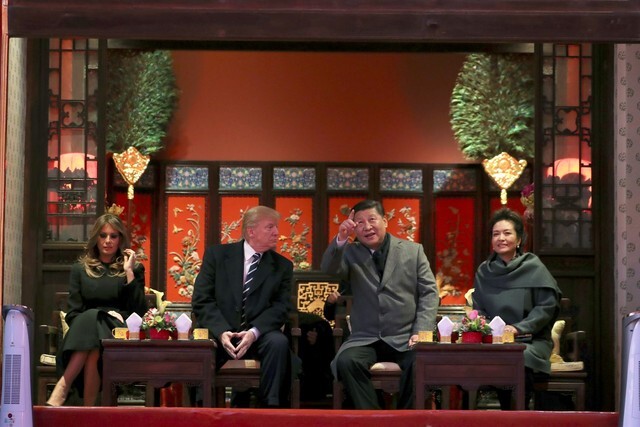hankyoreh
Links to other country sites 다른 나라 사이트 링크
[Column] Trump’s visit shows him to be more arms dealer than strategic leader

Donald Trump’s version of the “Romance of the Three Kingdoms” – an Asia tour that has taken him to Japan, South Korea, and now China – is starting to take definite shape. In Japan, all the talk was about his friendship and chummy golfing with Prime Minister Shinzo Abe, who rolled out the red carpet for the visiting US President. But as soon as he was gone, all that was left in his wake were bleak assessments and a balance sheet that fell short of expectations. The Washington Post offered a withering appraisal of the mutual warmth Abe had boasted of, calling the Prime Minister “Trump’s loyal sidekick” in a relationship of “strategic servitude to keep Trump supporting the postwar security alliance.”
Abe reminisced boastfully of how former Prime Minister Nobusuke Kishi – his grandfather, hero, and role model – had forged bonds of friendship over golf with then-President Dwight Eisenhower during a US visit in 1957, and ultimately succeeded in amending the US-Japan Security Treaty. Inspired by this, he flew to Trump Tower in New York as soon as Trump was elected, offering the president-elect golf clubs worth over US$5,000; since then, he has talked about the two of them golfing together in the US and Japan and the dozens of telephone conversations they have had. Conservatives here fretted loudly about how South Korea was being “bypassed,” and how (insufficiently US-friendly) President Moon Jae-in was being brushed aside in favor of Abe.
When the pivotal moment came, however, it was cash that moved Trump, who kept waving invoices in front of Abe’s nose. “The United States has suffered massive trade deficits with Japan for many, many years,” he said at one point. “[Abe] will shoot [North Korean missiles] out of the sky when he completes the purchase of lots of additional military equipment from the United States,” he said another time.
Trump continued looking more like a businessman or weapon salesman than a leader during his South Korean visit. His main message after his summit was that South Korea had pledged to order billions of dollars’ worth of military equipment. “[South Korea will] be ordering billions of dollars' worth of equipment, and we've already approved some of those orders,” he stressed.
His message was clear. The relationships between Trump’s US and countries in Asia are looking less like alliances and more transactional. Abe sucked up the humiliation of the “sidekick” and “servitude” digs, adopting a careful diplomatic approach with a strategy of bring South Korea, the India, and Australia in around its US alliance to counter China. Nevertheless, he ran into a fundamental roadblock: Trump’s focus on business and transactions ahead of strategy. Once Trump’s 12-day stay in Asia is over, the US’s soft power, influence, and trust there will have diminished, and the various government have to think about the region’s “post-US” future.
Another key part of the “Romance of the Three Kingdoms” story is the “Emperor’s homecoming.” On Nov. 8, Chinese President Xi Jinping met with Trump over tea at Sanxi Hall in the heart of the Forbidden City and held a banquet at Jianfu Palace. Sanxi Hall famously housed Qing Dynasty Emperor Qianlong’s library, while Jianfu Palace served as his residence and housed his jewels.
The choice to hold a banquet in a palace prized by an emperor who ruled over the Qing Dynasty’s height of dominance and economic prosperity may seem like a simple cordial welcome – but it could also be read as positioning the US president as second fiddle in the coronation of “Emperor Xi” as a symbol of the Chinese people’s great revival. An incompetent US leader, dogged by a special prosecutor’s investigation about alleged Russian election interference, struggling with terrible approval ratings, focused solely on financial results – it offers to the perfect conditions for a strong China’s rise under the Emperor’s leadership. What’s not to welcome?

But for China’s neighbors, the Xi Jinping era casts a pall of uncertainty. Even with the rationale of addressing all the issues that have built up over the country’s last 40 years of market economy development, it still carries with it an emphasis on one-man rule, stronger political and social controls, and a China-first mentality.
As an emperor, Qianlong was magnanimous to those who obeyed him, but ruthless to those who defied him. Standing on the shoulders of previous emperors, he ruled over an empire at its height – but it was also the time when that empire entered its decline. Which direction is Xi’s “new era” likely to go?
By Park Min-hee, international editor
Please direct questions or comments to [english@hani.co.kr]

Editorial・opinion
![[Guest essay] The real reason Korea’s new right wants to dub Rhee a founding father [Guest essay] The real reason Korea’s new right wants to dub Rhee a founding father](https://flexible.img.hani.co.kr/flexible/normal/500/300/imgdb/original/2024/0423/8317138574257878.jpg) [Guest essay] The real reason Korea’s new right wants to dub Rhee a founding father
[Guest essay] The real reason Korea’s new right wants to dub Rhee a founding father![[Column] ‘Choson’: Is it time we start referring to N. Korea in its own terms? [Column] ‘Choson’: Is it time we start referring to N. Korea in its own terms?](https://flexible.img.hani.co.kr/flexible/normal/500/300/imgdb/original/2024/0423/3617138579390322.jpg) [Column] ‘Choson’: Is it time we start referring to N. Korea in its own terms?
[Column] ‘Choson’: Is it time we start referring to N. Korea in its own terms?- [Editorial] Japan’s rewriting of history with Korea has gone too far
- [Column] The president’s questionable capacity for dialogue
- [Column] Are chaebol firms just pizza pies for families to divvy up as they please?
- [Column] Has Korea, too, crossed the Rubicon on China?
- [Correspondent’s column] In Japan’s alliance with US, echoes of its past alliances with UK
- [Editorial] Does Yoon think the Korean public is wrong?
- [Editorial] As it bolsters its alliance with US, Japan must be accountable for past
- [Guest essay] Amending the Constitution is Yoon’s key to leaving office in public’s good graces
Most viewed articles
- 1[Column] ‘Choson’: Is it time we start referring to N. Korea in its own terms?
- 2Senior doctors cut hours, prepare to resign as government refuses to scrap medical reform plan
- 3[Guest essay] The real reason Korea’s new right wants to dub Rhee a founding father
- 4Why Korea shouldn’t welcome Japan’s newly beefed up defense cooperation with US
- 5[Column] The clock is ticking for Korea’s first lady
- 6Opposition calls Yoon’s chief of staff appointment a ‘slap in the face’
- 7New AI-based translation tools make their way into everyday life in Korea
- 8Terry Anderson, AP reporter who informed world of massacre in Gwangju, dies at 76
- 9Korean government’s compromise plan for medical reform swiftly rejected by doctors
- 10[Editorial] Japan’s rewriting of history with Korea has gone too far